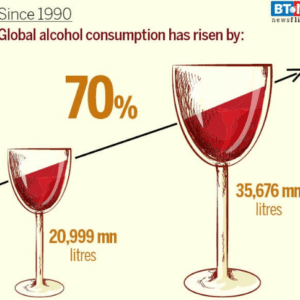Alcohol consumption is responsible for three million deaths every year as per the Global Status Report on alcohol and health – 2018.
A poster depicting rise in alcohol consumption since 1990
The report further highlights the grave consequences of alcoholism by holding the consumption of alcohol responsible for 10% of premature deaths while contributing to the global disease burden by 1%. The World Health Organization report has brought to the fore the inequalities cemented by alcoholism across the globe. As per the report, the alcohol-attributable disease burden is high in low and middle-income countries while alcohol-related hospitalization and deaths are more prominent in the vulnerable and disadvantaged sections.
Indian scenario: Desi Daru and double trouble!
A poster showing alcohol consumption rise
According to the Magnitude of substance use in India Report,2019 alcohol is the most common psychoactive substance used by Indians.
- Every 1 in 5 consumers in India is a victim of alcohol dependence and demands medical attention.
- The situation is aggravated by the fact that more than half of the alcohol consumed in India is unrecorded alcohol. Local or homemade brews that are adulterated are preferred over the unadulterated ones hence resulting in tragedies!
Dependence and tolerance: the toxic traits of alcohol!
Close up of the symptoms of alcohol intolerance
- Alcohol has dependence inducing properties and is therefore toxic. Alcoholism can be mild, moderate, or severe depending on the amount of consumption.
- Alcohol dependence and tolerance are the two serious consequences of long-term alcohol use.
- In case of alcohol tolerance, more amounts of alcohol will be consumed for creating a certain effect, or to be more specific a certain satisfaction will be craved by the consumer and he/she shall continue drinking until attaining the same.
- Alcohol dependence is a condition wherein the body and brain get used to the effects of alcohol, and the consumer isn’t able to resist the urge to drink.
No safe limit to drink! Kabhi kabhi chalta hai wouldn’t work – research highlights:
It is often believed that moderate amounts of alcohol do not cause much harm. But recent research highlights that there is no safe limit prescribed for alcohol consumption. Moderate amounts of alcohol can also cause harm.
But what is drinking in moderation? Well, it is defined as one or fewer drinks each day for females while two or fewer drinks each day for males. But to drink in moderation is also a medium of inviting diseases.
Heavy drinking or binge drinking causes severe health effects that show up earlier in comparison to moderate drinking i.e the effects are more noticeable when it comes to binge drinking. Moderate drinking shall bring up after-effects in the long run.
We are all aware of the immediate effects of alcohol consumption like the lack of coordination, slowed speech, mood changes, impulsive behavior, and euphoria. The after-effects of consuming alcoholic drinks are largely determined by the quantity and quality of the same. Alcohol takes a toll on physical and mental health over a certain period, but the immediate effects can put the consumer in awful situations which might have far-reaching consequences.
Long term effects:
- persistent mood swings
- constant feelings of anxiety and irritability
- insomnia
- weakened immune system
- libido changes
- appetite changes
- memory problems
Effect on internal organs:
Alcohol can be severe when it comes to affecting the internal organs. It affects various glands and internal organs and triggers diseases that could be life-threatening!
- It is often found that pancreatic inflammation is caused by heavy drinking. The condition of pancreatitis is triggered by the excessive use of alcohol. It activates the release of pancreatic digestive enzymes hence causing abdominal pain. Pancreatitis can become a long-term condition and can be life-threatening.
- Alcohol-related liver diseases and chronic liver inflammation are found in binge drinkers. The liver is responsible for the breakdown and removal of body toxins. Alcohol when consumed for a long time, interferes with this process hence leading to the formation of scar tissues that can cause permanent damage to the liver. Liver damage leads to waste build-up in the body which can be fatal.
- The improper functioning of the pancreas and liver causes low blood sugar levels, a condition that is often termed hyperglycemia. The pancreas is largely responsible for insulin regulation in the body.
- The frontal lobe of the central nervous system is responsible for several vital functions and is affected by the excessive consumption of alcohol. It reduces the communication between the brain and body making the thinking and reacting time balance difficult – a major reason why one shouldn’t drink and drive. Slurred speech intoxication is also an example that can be cited for the same. Central nervous system damages over time leading to numbness and tingling in the hands and feet.
- Heavy drinking might lead to Wernicke Korsakoff syndrome which is a brain disorder that affects memory adversely.
Likewise, heavy drinking has adverse effects on reproductive health, the circulatory system, and the immune system. Females who regularly consume alcohol witness changes in the menstrual cycle and are likely to be less fertile.
Alcohol withdrawal:
Alcohol withdrawal can be quite difficult and life-threatening for people who binge drink. In severe cases assistance is taken from healthcare experts. The victim experiences seizures, hallucinations, delirium, anxiety, nervousness, nausea, tremors, and high blood pressure. There are increased chances of alcohol use disorders in case of anxiety and depression.
15/02/22









